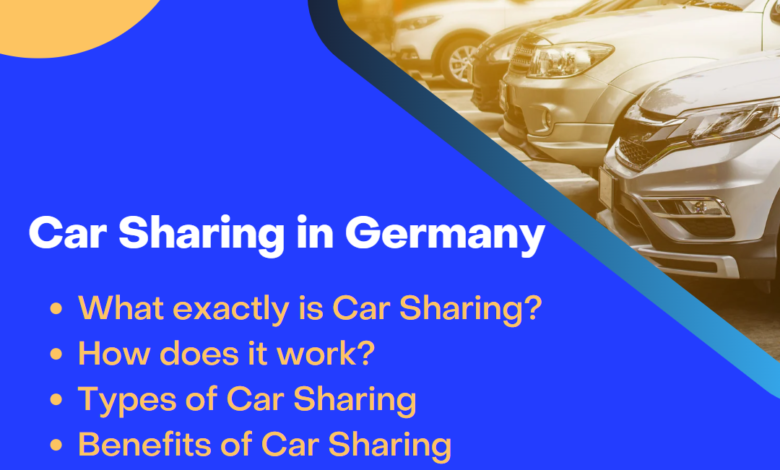Car Sharing in Germany

Car Sharing in Germany
Car-sharing vehicles are, for a majority of German residents, a sight that is all too familiar in recent years. More and more such vehicles can be spotted parked outside German homes.
Studies indicate that this phenomenon is steadily growing in popularity throughout the federal republic. Statistica reports that, in 2022, there were almost 900 German towns & cities that had these services.
What exactly is Car Sharing?
Not carpooling that’s what. When we say car-sharing, it is not simple carpooling where you share your Uber with someone else. It means hiring a vehicle from a firm that specifically provides car-sharing services. It is relatively cheaper, practical and, to add a cherry on top, a more eco-friendly option than owning private cars.
How does it work?
There are various companies in Germany that instantly provide users with vehicles. They can be hired using different apps.
Most rental companies base their fees on the length of the rental and the number of miles driven, although some use different business strategies.
Different Types
Classic car sharing
This type is the most prevalent in Germany. Classic car-sharing businesses run out of terminals or stations in certain places. You can reserve your preferred vehicle, rental duration, and station in advance using the provider’s app. When you are finished, drive back to the place where you picked up the car.
This arrangement typically has the lowest cost, not least because suppliers frequently include mileage reimbursement for traveling to and from the station.
Flexible car sharing
Flexible car sharing, as the name suggests, does not use the same system as the Classic type. Here, the cars are not parked at dedicated spots for rent. Instead, you can pick up or drop off a car at any convenient location within a predefined area. The predefined area is often the central part of a city or town.
Such vehicles may be parked around town, and you may immediately access them via the provider’s app. There is no need to make a reservation in advance. The software also allows you to find the closest vehicle to your current location.
Although this model is quicker and simpler than classic car sharing, the cost of this convenience is typically more.
Private car sharing
There are websites that enable private automobile owners to rent their cars peer-to-peer in addition to the larger, more established companies. This sharing strategy is made possible by websites like SnappCar, Turo, and Drivy and is proven to be especially well-liked in rural areas.
Private car sharing can be a cost-effective choice, but the caliber of the automobiles provided is up for grabs. They won’t be as up-to-date or maintained as those offered by established firms.
Benefits of Car Sharing
Low-Cost Alternative
Getting a new car is a difficult task in itself. The process gets more complex for foreigners. A personal car could be an unnecessary expense for someone who lives and works in the same city and does not plan to stay there for a long time. Renting a car from a regular agency may also be expensive. But with car sharing, you can save money.
Pay-As-You-Go
The Pay-As-You-Go business model is one factor that makes it a low-cost alternative. Car-sharing firms let you rent vehicles by the minute rather than the day, though some of them do charge a one-time registration fee. Others, however, provide customers with the choice of free weekday overnight parking. In a typical rental car, you are responsible for all of the vehicle’s time under your control.
Insurance
With Germany’s mandatory car insurance policy, the dents in the car owners’ pockets become inevitable. There are various factors that affect how much car insurance can cost like the type of vehicle and the driver’s age. There are cases when insurance can cost more than your car is worth. Car sharing helps you avoid all this insurance hassle.
Fuel Expenses
The average German driver spends 1.24% of their usual pay on fuel. Inflation and the war in Ukraine are certainly not helpful factors. But fuel expenses can be reduced with car sharing. There are some companies that do not even require you to pay for the fuel at partner stations. You might even get additional minutes if the fuel tank is half or less when picked up and more than 90% filled at the drop-off. The same is the case for recharging electric cars.
Environmental Concerns
The importance of living sustainably and protecting the environment is rising, especially in Germany. Limiting the usage of Internal Combustion Engine (ICE) vehicles is one strategy to reduce carbon footprints. Some people are starting to forego driving ICE vehicles altogether in favor of electric vehicles, bicycles, and other modes of public transportation. Yet, electric automobiles can be prohibitively expensive to buy. For foreigners living in Germany or those who intend to move abroad, it does not make sense to buy a car. Electric vehicles are becoming a part of car-sharing organization fleets.
Saves Time
Taking public transport can waste a lot of time. Car-sharing apps can show you the nearest available vehicles rather than making the trip to a rental agency to fill out the paperwork and pick up your vehicle. You can simply climb in, press the start button, and drive off.
Car sharing is a very useful tool for people, especially foreigners living in Germany, to save time, money, and aid in saving the environment.
Read more at How To Abroad:
€3000 Inflation Relief Bonus for Employees
Students to Receive €200 Energy Relief Payout

